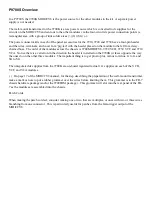
7
The StatLock® Stabilization Device Procedure
Single Lumen
1. Secure catheter with
StatLock® catheter stabilization
device.
2. Cover site and StatLock®
catheter stabilization device
with transparent dressing.
3. Place anchor tape sticky side
up, under hub. Wedge tape
between hub and wings.
4. Chevron anchor tape on top
of transparent dressing.
Dual Lumen
1. Secure catheter with
StatLock® catheter stabilization
device.
2. Cover site and StatLock®
catheter stabilization device
with transparent dressing.
3. Place 1st anchor tape sticky
side up, under one extension
leg. Wedge tape between hub
and wings. Chevron anchor
tape on top of transparent
dressing.
4. Place 2nd anchor tape sticky
side up under hub. Wedge
tape between hub and wings.
Chevron anchor tape on top of
transparent dressing.
Triple Lumen
1. Secure catheter with
StatLock® catheter stabilization
device.
2. Cover site and StatLock®
catheter stabilization device
with transparent dressing.
3. Place 1st anchor tape sticky
side up, under one extension
leg. Wedge tape between hub
and wings. Chevron anchor
tape on top of transparent
dressing.
4. Place 2nd and 3rd anchor
tapes sticky side up under
remaining hubs. Wedge tape
between hubs and wings.
Chevron anchor tape on top of
transparent dressing.
Tape Strip Stabilization Procedure
Single Lumen
1. Place 1st anchor tape over
wings.
2. Cover site and 1st anchor
tape with transparent dressing
up to hub, but not over hub.
3. Place anchor tape sticky side
up, under hub. Wedge tape
between hub and wings.
4. Chevron anchor tape on top
of transparent dressing.
Dual Lumen
1. Place 1st anchor tape over
wings.
2. Cover site and 1st anchor
tape with transparent dressing
up to hub, but not over hub.
3. Place 1st anchor tape sticky
side up, under one extension
leg. Wedge tape between hub
and wings. Chevron anchor
tape on top of transparent
dressing.
4. Place 2nd anchor tape sticky
side up under hub. Wedge
tape between hub and wings.
Chevron anchor tape on top of
transparent dressing.




























